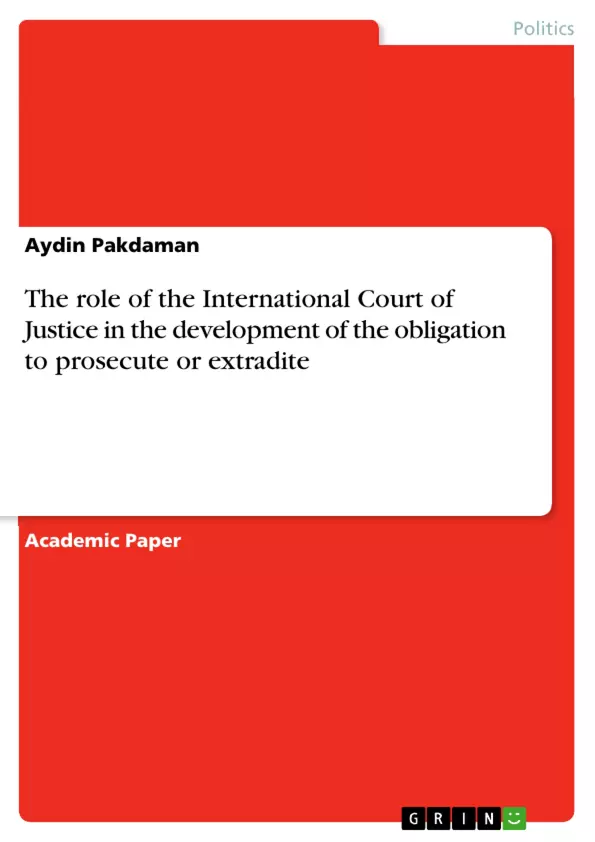The determination of the international community to combat non-criminality and the fight against international crime has prompted the international community to find ways to address the legal vacuum existing in international criminal law. Due to the temporary nature of the courts established since World War II, as well as the absence of major crimes such as terrorism and human trafficking in the Statute of the International Criminal Court, the international community is inclined towards domestic courts and plans for actions such as global jurisdiction and commitment to extradition or trial. Due to differences arising from the obligation to perform an extradition or trial, it is necessary to examine the principles governing this obligation.
Meanwhile, the judiciary and international bodies' opinions on these actions are of great importance. The International Court of Justice is one of the most prominent legal entities in the international community in terms of its distinctive and important role in the development of international law. In the present article, the Tribunal's judgments on the obligation to extradite or trial and the effect of the Court on the development of this commitment have been examined.
Inhaltsverzeichnis (Table of Contents)
- Introduction
- 1- Combating Non-Penalties in New International Law
- 1-1.Competence of domestic courts in the investigation of international crimes
- a. Qualification on the basis of international treaties and conventions
- b. Universal jurisdiction
- 1-2.obligation trial or extradition
- 1-1.Competence of domestic courts in the investigation of international crimes
Zielsetzung und Themenschwerpunkte (Objectives and Key Themes)
This article examines the role of the International Court of Justice (ICJ) in the development of the obligation to extradite or prosecute individuals accused of international crimes. The article explores the legal context surrounding this obligation, analyzing key ICJ judgments and their impact on international law.
- The evolving nature of international criminal law and the shift towards combating non-criminality.
- The increasing role of domestic courts in investigating and prosecuting international crimes.
- The principle of universal jurisdiction and its application in combating international crimes.
- The obligation to extradite or prosecute, its legal basis, and its application in practice.
- The role of the ICJ in developing international law related to the obligation to extradite or prosecute.
Zusammenfassung der Kapitel (Chapter Summaries)
The Introduction provides an overview of the article's focus, highlighting the significance of the ICJ in shaping international law on extradition or prosecution. It establishes the context of the obligation within the framework of international criminal law and the evolving role of states in combating non-criminality.
The first section discusses the emergence of combating non-criminality after World War II and the development of international criminal law. It examines the transition from temporary tribunals to the permanent International Criminal Court (ICC) and the expanding role of domestic courts. The section explores the jurisdictional bases for domestic courts in investigating international crimes, including treaties, conventions, and universal jurisdiction.
The second section delves into the obligation to extradite or prosecute. It examines the legal basis for this obligation, tracing its roots back to the 17th century. The section analyzes the application of this principle in international treaties and explores its significance in preventing impunity and ensuring the prosecution of international criminals.
Schlüsselwörter (Keywords)
This article focuses on key concepts such as extradition, trial, International Court of Justice, international criminal law, and universal jurisdiction. It examines the ICJ's role in shaping international law regarding the obligation to extradite or prosecute, providing insights into the interplay of national and international legal frameworks.
Frequently Asked Questions
What is the "obligation to extradite or prosecute"?
This legal principle, also known as 'aut dedere aut judicare', requires states to either extradite a person accused of an international crime to a state that will prosecute them or to try the person in their own domestic courts.
What role does the ICJ play in international criminal law?
The International Court of Justice (ICJ) contributes to the development of international law by providing judgments and opinions that clarify the obligations of states regarding international crimes and jurisdiction.
What is universal jurisdiction?
Universal jurisdiction allows domestic courts to investigate and prosecute individuals for serious international crimes, such as war crimes or torture, regardless of where the crime was committed or the nationality of the accused.
Why is the involvement of domestic courts increasing?
Due to the temporary nature of many international tribunals and the limited scope of the ICC (e.g., excluding terrorism), the international community increasingly relies on domestic legal systems to close the legal vacuum.
What are the challenges in implementing extradition or trial?
Challenges arise from differences in national laws, political sensitivities, and the lack of precise definitions for certain international crimes in global treaties.
- Quote paper
- Aydin Pakdaman (Author), 2018, The role of the International Court of Justice in the development of the obligation to prosecute or extradite, Munich, GRIN Verlag, https://www.grin.com/document/449810



